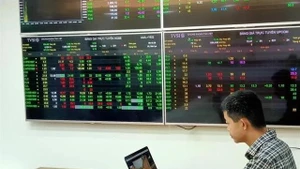Huge loss
A Vietnamese album download costs from US$6-10 per download on the iTunes Store. But the musicians and production teams, who work hard and spend billions of Vietnamese dong on their creations suffer a complete loss when their albums are shared free of charge on local websites as soon as they are released.
Recently, composer Huy Tuan and singer Van Mai Huong put great effort into the album ‘18+’. But just one day after the album was introduced to the press, it was already available on many music websites even though the album had not been officially released to the market. As a leading advocate of a campaign that encourages music fans to listen to legally purchased songs, Tuan is no exception when he falls victim to copyright infringement, a long-standing problem that plagues the Vietnamese music industry.
Tuan called upon the media and related professional circles to help resolve the situation in a pointed letter. “This is blatant copyright infringement,” he writes. “It is an indication of uncivilised consumer behaviour and disrespect for artists’ hard work and creativity. Creative professionals have been feeling discouraged for a long time and such violations make them less enthusiastic about releasing their musical works in full to the public. Instead they only make available a number of separate tracks on the web without paying attention to whether they can get anything for their hard work or not. Artists are desperate and they eventually give in to piracy. It is immensely damaging to the music market and listeners as well.”
Listening with awareness: mission impossible?
Late last year when media firm MV Corp announced that it would work with Vietnamese music websites and musicians to sell music online, many pinned their hopes on a boost to the local music industry. But after just a few months, MV Corp gave up after seven music websites grossed a paltry VND20 million (US$940) return. Since then the story of charging users for music downloads has slid into oblivion. How can music websites sell old low-quality albums when, with only a few clicks, users can download and listen to thousands of other albums free of charge?
Selling music would generate revenue, so why aren’t domestic websites taking advantage? Simply put, these sites make billions of Vietnamese dong in ad revenue. In return, they allow users to download music for free, thereby facilitating copyright infringement. Moreover, if they sell music, their revenue will be divided with composers, singers, the recording association and other agents. On the other hand, they need not share revenue from placing ads on their site. Therefore, online music websites in Vietnam still choose to live a parasitic existence, ignoring calls from musicians and disregarding both law and morality.
In the meantime, iTunes and a number of other foreign music sites have set out on a silent invasion into Vietnam. They begin with something that Vietnamese businesses usually neglect: negotiating an agreement on revenue sharing. In this case, Vietnamese music websites are defeated right on their home ground, though no one seems to care. So musicians continue to compose new works and appeal for help. Whether consumers will listen with awareness remains an unanswered question.
















